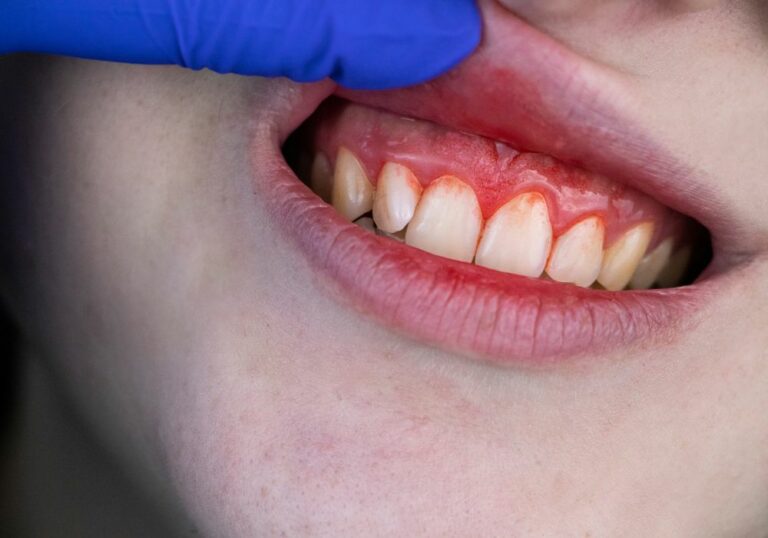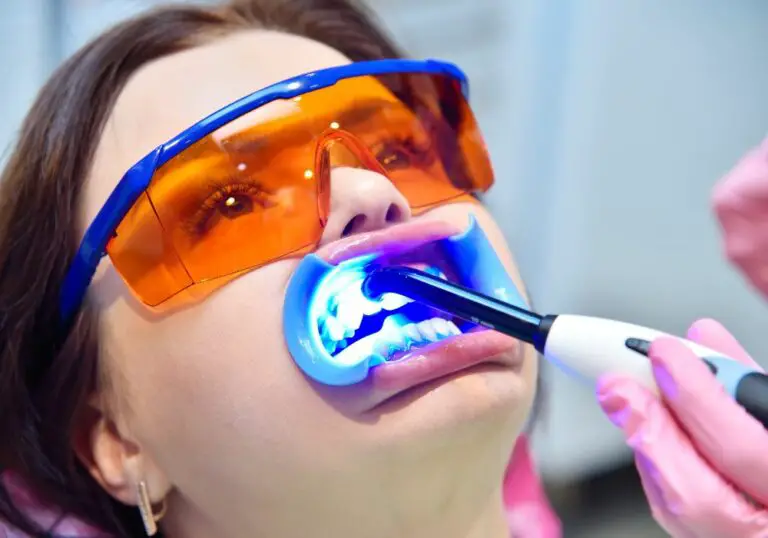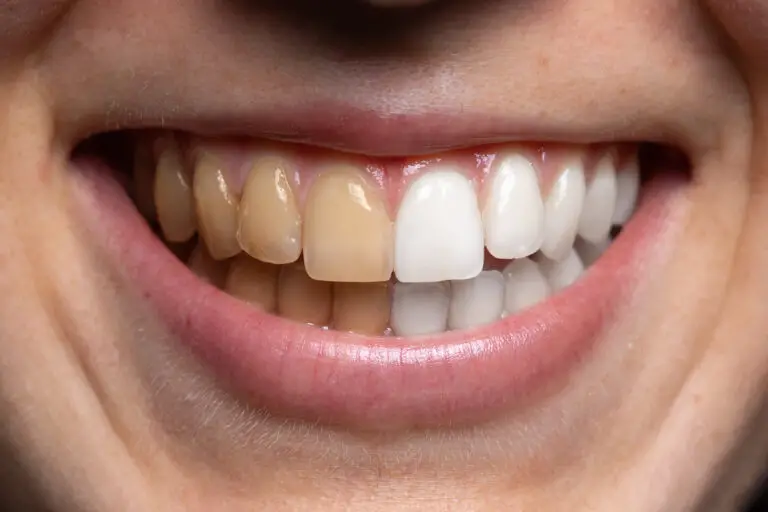Do your teeth feel soft when you bite down? This sensation can be concerning and may indicate a dental issue. While tooth enamel is the hardest substance in the human body, it can still be damaged by acid erosion, tooth decay, or other factors. In this article, we will explore the possible causes of teeth feeling soft when you bite down and what you can do about it.
One possible cause of teeth feeling soft when you bite down is tooth decay. When bacteria in your mouth produce acid, it can wear away your tooth enamel, leaving your teeth vulnerable to decay. Over time, decay can cause your teeth to become weak and feel soft when you bite down. Another possible cause is acid erosion, which can be caused by consuming acidic foods and drinks or acid reflux. This can also wear away your tooth enamel and make your teeth feel soft.
If you are experiencing this sensation, it is important to see a dentist to determine the cause and receive appropriate treatment. Depending on the cause, treatment options may include fillings, crowns, or other dental procedures. In addition, practicing good oral hygiene habits, such as brushing and flossing regularly and avoiding acidic foods and drinks, can help prevent further damage to your teeth.
Understanding Tooth Sensitivity
If you’re experiencing tooth sensitivity, you’re not alone. Many people experience this discomfort when they bite down or chew. Understanding the causes and symptoms of tooth sensitivity can help you take steps to alleviate the discomfort.
Causes of Tooth Sensitivity
Tooth sensitivity can be caused by a variety of factors, including:
- Enamel erosion: When the enamel on your teeth wears away, it can expose the sensitive layer of dentin underneath.
- Gum recession: When your gums recede, the sensitive roots of your teeth can become exposed.
- Tooth decay: Cavities can cause sensitivity when they reach the nerves of your teeth.
- Teeth grinding: Grinding your teeth can wear down the enamel and expose the sensitive dentin.
- Acidic foods and drinks: Consuming acidic foods and drinks can erode the enamel on your teeth.
Symptoms of Tooth Sensitivity
If you have tooth sensitivity, you may experience:
- Pain or discomfort when you bite down or chew
- Sensitivity to hot or cold temperatures
- Pain or discomfort when consuming sweet or acidic foods and drinks
- Pain or discomfort when brushing or flossing your teeth
If you’re experiencing tooth sensitivity, it’s important to talk to your dentist. They can help determine the cause of your sensitivity and recommend treatment options. In the meantime, you can try using a toothpaste designed for sensitive teeth, avoiding acidic foods and drinks, and using a soft-bristled toothbrush.
Why Teeth Might Feel Soft When Biting Down
If you’ve ever felt like your teeth are soft when biting down, it can be a concerning and uncomfortable experience. There are several reasons why your teeth might feel soft when you bite down, including tooth erosion and dental caries.
Effects of Tooth Erosion
Tooth erosion is the gradual loss of tooth structure due to acid exposure. This can be caused by a variety of factors, including acidic foods and drinks, certain medications, and acid reflux. When enamel is eroded, it can leave the underlying dentin exposed, which can cause your teeth to feel soft when you bite down.
In addition to feeling soft, tooth erosion can also cause other symptoms, such as sensitivity to hot and cold temperatures, discoloration, and rounded teeth. If left untreated, tooth erosion can lead to more serious dental problems, such as cavities and tooth loss.
Influence of Dental Caries
Dental caries, also known as cavities, are caused by bacteria that produce acid and break down tooth enamel. This can cause your teeth to feel soft when you bite down, as well as sensitivity, pain, and visible holes in your teeth.
Dental caries can be prevented by practicing good oral hygiene, such as brushing and flossing regularly and avoiding sugary foods and drinks. If you suspect you have a cavity, it’s important to see your dentist as soon as possible to prevent further damage to your teeth.
In conclusion, if your teeth feel soft when you bite down, it’s important to identify the underlying cause and seek treatment if necessary. Whether it’s tooth erosion or dental caries, taking care of your teeth and maintaining good oral hygiene can help prevent further damage and keep your teeth healthy and strong.
Professional Diagnosis and Treatment

If you’re experiencing soft teeth when biting down, it’s important to schedule a dental check-up as soon as possible. Your dentist will be able to diagnose the issue and recommend an appropriate course of treatment.
Dental Check-Up
During your dental check-up, your dentist will examine your teeth and gums for signs of decay, gum disease, and other issues that could be causing your teeth to feel soft. They may also take X-rays to get a better look at the underlying structures of your teeth.
If your dentist determines that the issue is related to gum disease, they may recommend a deep cleaning or scaling and root planing procedure to remove plaque and tartar buildup from your teeth and gums. In more severe cases, they may refer you to a periodontist for specialized treatment.
Treatment Options
The specific treatment for soft teeth will depend on the underlying cause of the issue. In some cases, your dentist may recommend a fluoride treatment or prescription toothpaste to help strengthen your teeth and prevent further decay.
If the issue is related to acid reflux or heartburn, your doctor may recommend lifestyle changes or medications to reduce the amount of acid in your stomach. This can help prevent further damage to your teeth and gums.
In some cases, your dentist may recommend restorative procedures such as dental bonding or crowns to repair damaged or weakened teeth. If the issue is severe, they may recommend extraction and replacement with a dental implant or bridge.
Remember, early diagnosis and treatment are key to preventing further damage to your teeth and gums. Be sure to schedule regular dental check-ups and address any issues as soon as they arise.
Preventive Measures
When your teeth feel soft, it is important to take preventive measures to avoid further damage. There are two main areas to focus on: oral hygiene practices and dietary adjustments.
Oral Hygiene Practices
Maintaining good oral hygiene practices can help prevent tooth decay and gum disease, which can cause teeth to feel soft. Here are some tips to follow:
- Brush your teeth at least twice a day with a soft-bristled toothbrush and fluoride toothpaste.
- Floss daily to remove plaque and food particles from between your teeth.
- Use an antiseptic mouthwash to kill bacteria that can cause gum disease.
- Visit your dentist regularly for check-ups and cleanings.
- Avoid using tobacco products, which can cause gum disease and tooth decay.
Dietary Adjustments
The foods and drinks you consume can also impact the health of your teeth. Making dietary adjustments can help prevent tooth decay and gum disease. Here are some tips to follow:
- Limit your consumption of sugary and acidic foods and drinks, such as candy, soda, and citrus fruits.
- Drink plenty of water to help wash away food particles and bacteria.
- Choose foods that are rich in calcium and vitamin D, such as milk, cheese, and leafy greens, to help strengthen your teeth.
- Chew sugar-free gum after meals to help stimulate saliva production, which can help neutralize acids in the mouth.
By following these preventive measures, you can help keep your teeth healthy and prevent them from feeling soft. Remember to always consult with your dentist if you have concerns about the health of your teeth.
When to Seek Immediate Dental Care

If you experience soft teeth when you bite down, it could be a sign of a serious dental issue. While some dental problems can wait until your next appointment, others require immediate attention from a dental professional. Here are some situations where you should seek immediate dental care:
Severe Pain
If you are experiencing severe or persistent toothache, it could be a sign of an underlying dental problem like tooth decay or infection. Ignoring the pain may worsen the condition and make future treatment more complicated. It is important to seek immediate dental care if you are experiencing severe pain.
Bleeding and Swelling
If you notice bleeding or swelling in your gums, it could be a sign of gum disease. Gum disease can lead to tooth loss if left untreated. It is important to seek immediate dental care if you notice bleeding or swelling in your gums.
Broken or Chipped Teeth
If you break or chip a tooth, it is important to seek immediate dental care. A broken or chipped tooth can cause pain and sensitivity, and can also lead to infection if left untreated.
Loose Teeth
If you notice that your teeth are becoming loose, it could be a sign of gum disease or other dental problems. It is important to seek immediate dental care if you notice that your teeth are becoming loose.
Other Dental Emergencies
Other dental emergencies that require immediate attention include knocked-out teeth, abscesses, and jaw injuries. If you experience any of these issues, it is important to seek immediate dental care.
In general, if you experience any dental issues that cause you pain or discomfort, it is important to seek immediate dental care. Your dentist can provide you with the treatment you need to alleviate your symptoms and prevent further damage to your teeth and gums.
Frequently Asked Questions
Why do my teeth feel soft when I bite?
If you feel like your teeth are soft when you bite, it could be due to a variety of reasons. One common cause is tooth decay. When your teeth are exposed to acid from bacteria in your mouth, it can weaken the enamel and make your teeth feel soft. Another possible cause is gum disease, which can cause the bone supporting your teeth to deteriorate, making your teeth feel loose and soft.
Are teeth supposed to feel soft?
No, teeth are not supposed to feel soft. Healthy teeth should feel strong and sturdy when you bite down. If your teeth feel soft or flimsy, it could be a sign of tooth decay or gum disease.
How to strengthen soft teeth?
If your teeth feel soft, it’s important to see a dentist as soon as possible. They can determine the underlying cause of your soft teeth and recommend the best treatment options. In some cases, your dentist may recommend fluoride treatments or dental sealants to help strengthen your teeth and protect them from further damage.
What are the symptoms of soft tooth decay?
The symptoms of soft tooth decay can vary, but some common signs include tooth sensitivity, pain when biting down, and visible holes or pits in your teeth. If you notice any of these symptoms, it’s important to see a dentist as soon as possible to prevent further damage.
What is the treatment for soft teeth?
The treatment for soft teeth will depend on the underlying cause. If the softness is due to tooth decay, your dentist may recommend fillings or crowns to repair the damage. If gum disease is the cause, your dentist may recommend deep cleaning or surgery to remove the infected tissue and restore the health of your gums.
Why do my teeth feel flimsy?
If your teeth feel flimsy, it could be a sign of tooth decay or gum disease. It’s important to see a dentist as soon as possible to determine the underlying cause and prevent further damage. Your dentist may recommend treatment options such as fillings, crowns, or deep cleaning to restore the health of your teeth and gums.







